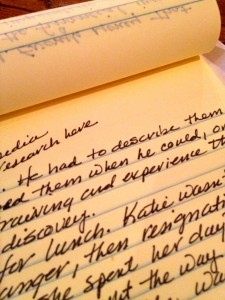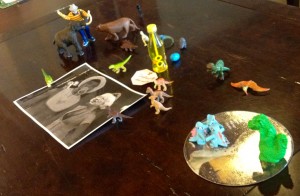 What I’ve realized I need is a system with a single notebook. One problem with decluttering has been the number of old, half-filled notebooks that have surfaced amid the piles and books, some taken from the storage locker after lingering there a literal decade. I’m writing this originally in one of those: 5×8, unruled, a stiff, translucent purple cover, originally intended as a spiritual journal. Since then it’s accumulated a number of to-do lists, some pieces of stories, a few book review notes, and some timed writings (including “Prophetic Lobster Man,” which appeared in The Mad Scientist Journal).
What I’ve realized I need is a system with a single notebook. One problem with decluttering has been the number of old, half-filled notebooks that have surfaced amid the piles and books, some taken from the storage locker after lingering there a literal decade. I’m writing this originally in one of those: 5×8, unruled, a stiff, translucent purple cover, originally intended as a spiritual journal. Since then it’s accumulated a number of to-do lists, some pieces of stories, a few book review notes, and some timed writings (including “Prophetic Lobster Man,” which appeared in The Mad Scientist Journal).
But it must go in a box and soon. I can’t trail fifteen gazillion notebooks along on a trip. I need one at a time, and preferably one that fits easily in a purse so I can have it ever handy but still has enough page space that I don’t feel cramped. Writing on scraps of paper when no notebook is handy has been my undoing in the past.
At the same time, I need to back up what I’m doing, so I’m contemplating a system where I write in my (solitary) notebook and then transcribe either every night or as time permits.
I hope to go through (many more) than one notebook, so I’ll mail the filled ones as they accumulate, probably to my friend Caren.
I have been thinking about why the idea of losing writing bothers me so much. Part of it is my consciousness of having lost big chunks of it in the past: an entire novel, multiple half-finished short stories, poems, and journals entries (the last of arguable interest or value to anyone but me).
Because I could see myself going back to some, at least, of that stuff to remind myself of what that age was like when writing a character somewhere around the same age. Or to mine for stuff. Or simply to see how I’ve changed.
I feel as though most of my writing should be out there working for me. Ironically enough for someone with socialist leanings, I think of the pieces as rental properties, which should be actually housing readers, however temporarily, and earning me either money or fans who will buy other pieces.
In this attitude, I am a crassly commercial writer, despite my literary background, and I feel that when writing that could be out there earning for me isn’t, it’s wasted. It’s not that I feel every word of mine is so valuable that I must get paid for it — there’s plenty of journal maunderings and half-finished stories or essays and always will be.
It’s more that, as a writer, and particularly as someone who’s been primarily a short story writer, I am painfully aware of how crappily we’re paid.
So I want to make the most of the words that spill out of me and, more than that, I know that I’m vain enough that praise is a worthy form of coin. I love it when someone’s read a piece and praises it in an e-mail or a public recommendation.
So how can I best preserve these efforts, in order to most effectively sing for my supper? Notebook and Google Docs seem my best bet so far.
And crucial to this effort as well: putting away all these current half-filled notebooks. One more part of the de-cluttering, a process where I’m currently down to the last 10% or so, a few loads for Value Village and a suitcase or two now that the storage pods have come and swallowed up the heap of boxes that had towered in the front room here. Doing a load of laundry, I’m mentally consigning half the shirts to the discard heap, weighting clothing on a new algorithm of comfort plus presentability plus durability/discardability.
Almost ready to launch.







4 Responses
This is me as well; doesn’t matter how old the story is, or how stilted the writing. It’s why I’ve gone mostly digital these days. You can back stories up and return over time.
Something I’ve found that helps, if you run short on transcribing time; taking pictures of the pages. I mostly use Evernote, but you can likely do it with a smartphone and have the pictures in the cloud within the hour. Ideally you never have to transcribe from them, but if you have to…
I admit to some envy and great admiration about the amount of decluttering you’ve gone through, and wish you all the best. (And since I don’t think I’ve ever said it–I love what I saw of the Beasts of Tabat, and try to loan my copy of Near + Far out to people because there are so many damn good stories in it.)
Safe travels.
I can relate to this problem with half (or less) filled notebooks. I have an addiction to buying them as well. The upside is that each time I pick up an old one and flick through it I find something new; an idea or outline or the beginning of something I dreamed up long ago. Not always worth pursuing though. 🙂 Enjoy the trip!
I have the same issues—tons of little pieces of paper strewn about, half-filled notebooks, small ones for the purse, larger ones for the nightstand. It’s getting crazy because lately I found a handful of stories I forgot I wrote! I’m in the process of making a list of finished ones, partials, etc. but that doesn’t fix the paper problem. I did recently find a nice little spiral thingy for the purse that actually has pockets. That was exciting. LOL. Have a good trip and don’t forget to write!